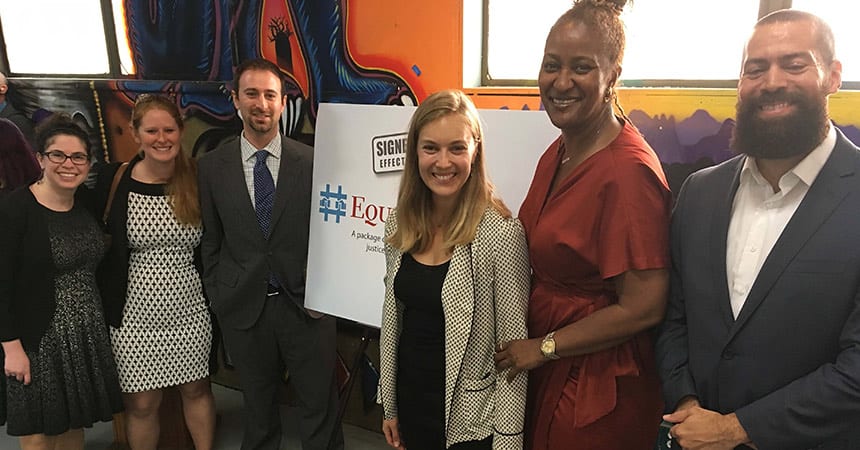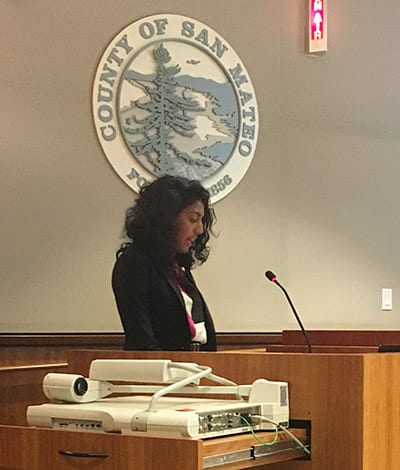
By Andrew Cohen
On January 1, 2018, a new law went into effect barring California counties from charging administrative fees to parents and guardians of youth in the juvenile legal system. Senate Bill 190 was the culmination of more than five years of research and outreach by students in Berkeley Law’s Policy Advocacy Clinic (PAC) to end such fees, which disproportionately harm low-income people of color, destabilize families, and undermine public safety.
Although the bill’s enactment was a historic moment for fee reform in the state and nationally, clinic Director Jeff Selbin knows that debt-free justice will remain elusive if counties fail to fully implement the new law. To help make sure families get the intended relief, PAC faculty and students are busy monitoring enforcement of SB 190 in all 58 California counties.
“This issue was first identified by the Youth Justice Coalition in Los Angeles and by lawyers and Berkeley Law students at the East Bay Community Law Center. For all the hard work of these and other activists and advocates to pass SB 190, the bill will only be as effective as the implementation on the ground,” Selbin says. “We’re committed to making sure counties comply with the new law, and we’re urging them to go beyond what’s required to make the most of this opportunity to get money out of the juvenile system once and for all.”
The clinic’s latest report presents key findings from county responses to Public Records Act requests, interviews, and follow-up with state and local stakeholders regarding the bill’s implementation—and the status of juvenile and young adult fee reform in California. It also includes recommendations to ensure full compliance with SB 190 and to realize the full benefit of fee abolition.
Before SB 190, the state authorized counties to bill families for their children’s detention, representation by counsel, electronic monitoring, probation supervision, and drug testing. Eliminating the fees removes a direct source of financial harm to some of the state’s most vulnerable families, supports the reentry of youth back into their homes and communities, and reduces the likelihood that youth will recidivate.
The report notes that California counties have complied with most of the bill’s central provisions, and that many counties have undertaken further reforms in the spirit of SB 190. However, the clinic’s research also pinpointed vital instances in which some counties are not complying.
PAC student Sarah Brandon ’22 helped develop an interactive map that shows how each county is faring with the legislation.
“The implementation process is often overlooked, but it’s such a crucial part of ensuring that what we advocate for actually happens, whether that’s through proactively tracking data or holding counties accountable to comply with the new law,” she says. “PAC is committed to ending practices that harm youth and their families, and I think focusing as much on this kind of follow-through work as passing a new law is an important part of maintaining that commitment.”
Students sent Public Records Act requests to counties to learn as much as possible about their compliance with SB 190. They wrote memos to support PAC’s client, the Western Center for Law and Poverty, and followed up directly with system-involved people to help them with the fees they are facing.

According to Western Center Legislative Advocate Jessica Bartholow, “The students’ research and advocacy was instrumental to the success of SB 190. All too often, groups celebrate and move on to other things after a bill is signed thinking they’ve won the battle. The clinic’s ongoing dedication to making sure the law is implemented for all families across the state is a model for how policy advocacy should work.”
Prioritizing those affected
Anu Ramdin ’21 was drawn to the project from her interest in using non-litigation strategies to combat systemic racism. “I especially like that PAC’s work necessitates collaboration with multiple disciplines and allows us to center the perspectives of those most affected by these racially discriminatory fees,” she says.
Examples of non-compliance with SB 190 include assessing prohibited fees against families through child support orders for out-of-home placements made as a condition of release or probation, and charging fees to young people ages 18 to 21 in criminal court for home detention, and for electronic monitoring and drug testing.
Some counties also continue to collect juvenile fees assessed prior to January 1, 2018 totaling more than $136 million. San Diego, Orange, Riverside, Tulare, and Stanislaus counties account for more than 95 percent of the total still being collected from families. Also concerning, many counties have not notified young people and families of SB 190 fee relief.
On the plus side, some counties stopped charging juvenile fees beyond those repealed by SB 190 and several undertook additional fee reforms in the adult criminal legal system.
PAC Supervising Attorney Stephanie Campos-Bui ’14, who las led the clinic’s efforts in California, notes how much has been accomplished already: “The majority of counties have taken it upon themselves to end the collection of more than $237 million in previously assessed fees. Such widespread relief is unprecedented in the history of criminal justice reform, and can serve as a model for debt-free justice in other states.”
For counties, the report’s recommendations include: Stop assessing all SB 190-prohibited fees through child support orders and to young people ages 18 to 21 in criminal court, stop collecting and discharge all previously assessed fees, and notify young people and families of all fee relief.
For the state, recommendations include: Requiring local child support agencies to comply with SB 190, enacting a new law to make all previously assessed fees unenforceable and uncollectable, and vacating all court judgments, stipulated agreements, and other instruments imposing such fees.
“The most rewarding part for me is definitely being able to have direct communication with system-involved individuals who are affected by these fees,” Ramdin says. “These people are the reason we’re doing this work.”